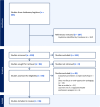Anti-oppression pedagogy in health professions: a scoping review
- PMID: 38740650
- PMCID: PMC11925985
- DOI: 10.1007/s10459-024-10336-0
Anti-oppression pedagogy in health professions: a scoping review
Abstract
Health professional learners are increasingly called to learn about health inequity to reduce inequities and improve patient care and health outcomes. Anti-oppression pedagogy (AOP) addresses the need for health professional learners to understand multiple health inequities and the structures and systems that produce inequities. However, the inclusion of AOP in health professions education varies and there is a lack of clarity in its conceptualization and integration. A scoping review was conducted to address this gap and to understand how AOP is conceptualized and integrated in health professions education. Thirty-six articles met the inclusion criteria. The articles demonstrated that AOP is not commonly utilized terminology within health professions education. When AOP is integrated, it is not consistently conceptualized but is generally viewed as a broad concept that focuses on antiracism; decoloniality; intersectionality; and supporting learners to understand, critically reflect on, and act against structural and systemic forms of oppressions. In addition, there is variation in the integration of AOP in health professions education with the most common methods consisting of discussions, cases, reflection, learning through lived experiences, and the incorporation of humanities within a longitudinal curriculum. The results of this scoping review highlight the need for health professions education to develop one clear concept that educators use when teaching about anti-oppression, which may reduce working in silos and allow educators to better collaborate with each other in advancing this work. In addition, this review suggests that health professional programs should consider incorporating AOP in curricula with a broad and longitudinal approach utilizing the common methods of delivery. To better support programs in including AOP in curricula, further research is required to emphasize the benefits, provide clarity on its conceptualization, and determine the most effective methods of integration.
Keywords: Antiracism; Decoloniality; Health inequity; Health professions education; Structures of oppression; Systems of oppression.
© 2024. The Author(s).
Conflict of interest statement
Declarations. Competing interests: The authors declare no competing interests. Conflict of interests: The authors did not receive support from any organization for the submitted work and have no competing interests to declare that are relevant to the content of this article.
Figures
Similar articles
-
Student and educator experiences of maternal-child simulation-based learning: a systematic review of qualitative evidence protocol.JBI Database System Rev Implement Rep. 2015 Jan;13(1):14-26. doi: 10.11124/jbisrir-2015-1694. JBI Database System Rev Implement Rep. 2015. PMID: 26447004
-
Health Humanities curriculum and evaluation in health professions education: a scoping review.BMC Med Educ. 2021 Nov 10;21(1):568. doi: 10.1186/s12909-021-03002-1. BMC Med Educ. 2021. PMID: 34753482 Free PMC article.
-
Exploring conceptual and theoretical frameworks for nurse practitioner education: a scoping review protocol.JBI Database System Rev Implement Rep. 2015 Oct;13(10):146-55. doi: 10.11124/jbisrir-2015-2150. JBI Database System Rev Implement Rep. 2015. PMID: 26571290
-
Understandings and practices: Towards socially responsive curricula for the health professions.Adv Health Sci Educ Theory Pract. 2023 Oct;28(4):1131-1149. doi: 10.1007/s10459-023-10207-0. Epub 2023 Feb 2. Adv Health Sci Educ Theory Pract. 2023. PMID: 36732399 Free PMC article.
-
Applications of Artificial Intelligence for Nonpsychomotor Skills Training in Health Professions Education: A Scoping Review.Acad Med. 2025 May 1;100(5):635-644. doi: 10.1097/ACM.0000000000005983. Epub 2025 Jan 28. Acad Med. 2025. PMID: 39874445
References
-
- Afolabi, T., Borowsky, H. M., Cordero, D. M., Paul, D. W. J., Said, J. T., Sandoval, R. S., Davis, D., Olveczky, D., & Chatterjee, A. (2021). Student-led efforts to advance anti-racist medical education. Academic Medicine: Journal of the Association of American Medical Colleges,96(6), 802–807. 10.1097/ACM.0000000000004043 - PubMed
-
- Altman, M. R., Kantrowitz-Gordon, I., Moise, E., Malcolm, K., Vidakovic, M., Barrington, W., O’Connor, M. R., & de Castro, A. B. (2021). Addressing positionality within case-based learning to mitigate systemic racism in health care. Nurse Educator,46(5), 284–289. 10.1097/NNE.0000000000000937 - PubMed
-
- Aqil, A. R., Malik, M., Jacques, K. A., Lee, K., Parker, L. J., Kennedy, C. E., Mooney, G., & German, D. (2021). Engaging in anti-oppressive public health teaching: Challenges and recommendations. Pedagogy in Health Promotion,7(4), 344–353. 10.1177/23733799211045407
-
- Arksey, H., & O’Malley, L. (2005). Scoping studies: Towards a methodological framework. International Journal of Social Research Methodology,8(1), 19–32. 10.1080/1364557032000119616
-
- Association of American Medical Colleges. (2022). Diversity, equity, and inclusion competencies across the learning continuum (pp. 1–29). Association of American Medical Colleges. https://store.aamc.org/downloadable/download/sample/sample_id/512/
Publication types
MeSH terms
LinkOut - more resources
Full Text Sources
Medical
Miscellaneous



